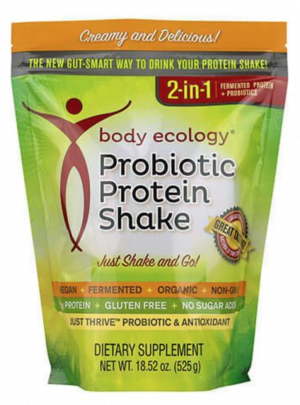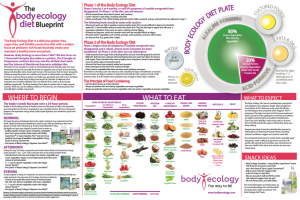How to digest proteins: Your health depends on it
Figuring out how to digest protein sounds simple enough. After all, isn’t that what your body was designed to do? Dietary proteins give you the basic building blocks you need to create tissue.
The proteins in food also support the nervous system, keeping the mind healthy and alert. But what happens when you are not able to digest protein so well?
What Your Body Needs to Digest Protein
We all know protein can be hard to digest, especially when it’s coming exclusively from animal foods. Unlike many other protein powders, the Body Ecology Probiotic Protein Shake is predigested and contains a complete vegan pea protein. Because it is fermented and predigested, our protein shake is ready for the body to use.
In order to digest protein, the body requires two things:
- Stomach acid, or HCl (hydrochloric acid)
- Enzymes, which break down food
It’s important to understand that it’s not the stomach acid that breaks down food — it is the enzymes.
Enzymes rely on stomach acid to turn them on. Without stomach acid, enzymes remain dormant and inactive. Ideally, before protein reaches the small intestine, it has already encountered active enzymes and been broken down into amino acids within the stomach. But this doesn’t always happen. And it doesn’t help that the body starts to produce fewer enzymes with age.
You see, enzymes don’t only require stomach acid. They also require a specific pH, which is the balance of acidity and alkalinity. Enzymes like the stomach to be very acidic.
Maintaining the right environment is extra-important to promote healthy levels of enzyme activity in the body — and enzymes serve a number of roles that most of us probably aren’t even aware of. Years ago, Massachusetts General Hospital researchers discovered that taking an enzyme by mouth could have a direct impact on gut health. When taken orally, the enzyme intestinal alkaline phosphatase (IAP) that helps to keep gut bacteria out of the bloodstream also helped to maintain normal microbial populations in the G.I. tract — helping to replenish the gut after a round of antibiotics.1 The oral enzyme amylase is also used by the body to regulate blood glucose after eating starch.2
How to Digest Protein: Probiotics Are the Cornerstone of Good Digestion
Your inner ecosystem — or the community of bacteria and yeast in the body — makes the body acidic or alkaline. Depending on which bacteria and yeast you harbor (and where), you can either be too alkaline, too acidic, or in just the right place to get the job done.
The enzymes within the stomach rely on a specific balance of acidity and alkalinity. Remember, enzymes that break down protein require an acidic environment.
Microbes living in the stomach can upset this balance to ensure their own survival.
These microbes, known as Helicobacter pylori, can make the stomach too alkaline. This means that they can steal your “digestive fire,” allowing whole molecules of protein to pass through the stomach and into the small intestine. Once in the small intestine, protein and other pieces of food are met with the same problem. If the inner ecosystem is out of balance, the environment may be too acidic or too alkaline to activate enzymes.
When enzymes remain inactive, food stagnates or passes through undigested.
Unfortunately, the small intestine is a place where bacteria and yeast like to build up communities — if they can. But for most microbes, the small intestine is a temporary pit stop. It’s not meant for long-term housing. So when bacteria and yeast decide to live there, problems develop.
Otherwise known as SIBO (small intestine bacterial overgrowth), these problems include:
- Gas and cramps after eating
- Heartburn
- Irregular bowel movements, ranging from diarrhea to constipation
This is where probiotics come into the picture. Probiotics are bacteria and yeast that do good things for the body (like kill the bad guys, fight bacterial overgrowth, and calm inflammation). When you eat probiotic foods, you give your gut the material it needs for optimal health. All of these big probiotic benefits start as early as birth — the probiotics found in breast milk, some containing Lactobacillus reuteri, can help to reduce or eliminate painful cramping in a baby’s gut.3 Probiotics were also found to be an effective treatment for colitis.4 In 2015, probiotics were shown to improve behavioral symptoms of chronic inflammatory diseases by changing the communication between the immune system and the brain.5
How to Find Balance and Digest Your Protein
If you have been vegan for a long period of time, you may struggle to digest protein — especially if you have switched over to animal proteins. If you eat several meals a day that are high in protein (for example, some approaches to the Paleo Diet), you may not be digesting it fully.
To optimize digestion, follow Body Ecology’s food combining chart:
We believe that plant foods are good for your gut and good for you.
One of the most common issues we see in the health, diet, and exercise community is difficulty digesting protein on a high-protein diet. This comes up most often with animal proteins — which is why we recommend only 20 percent of potentially acid-forming animal proteins on your plate. But for athletes eating a high-protein diet and for those with gut dysbiosis who are just struggling to maintain their protein intake, this can be a big problem. Animal proteins may not be fully absorbed and digested by the body. Yet other protein sources, like fermented pea protein, are predigested and easy for the body to use.
Body Ecology’s Immune Power Protein Shake, available in delicious chocolate flavor, walks that fine line between the two. Made with a complete vegan fermented pea protein, all of the difficult-to-digest proteins in the shake have been broken down for you — through the fermentation process. This is really huge for a protein! A bioavailable, easy-to-digest protein source can thwart any potential digestive issues, while providing the high-quality protein the body needs to build and repair each day. Researchers also discovered in a study conducted on 44 young, healthy men who were weight training, that taking a protein supplement increased muscle mass and strength twice as much as the placebo.6
Other factors that can affect how well you digest protein include:
- History of antacid use, prescription or over-the-counter
- History of antibiotic use
- Overeating at mealtime
- Drinking too much water before or during meals
- Poor sleep
- Stress, especially during mealtime
If you have trouble digesting protein, the best way to restore the balance of acidity within the stomach is with HCl and enzymes. HCl (hydrochloric acid) safely restores the acidic environment of the stomach while active enzymes begin to break down protein.
Fermented foods gently bring the inner ecosystem back into a state of balance. We suggest always including a side of cultured veggies with your meal. Or instead of water, drink coconut water kefir with meals to assist in the digestion of protein-rich foods.
Just as Important? The Value of Relaxation
When it comes to weak stomach acid, heartburn, and poor digestion of protein — stress is one of the biggest offenders.
Ohio State University Wexner Medical Center researchers found that mindfulness-intervention in the workplace helped to reduce stress by up to 40 percent among nurses — with results measured by the amylase enzyme levels in saliva. Salivary amylase is a sympathetic response from the nervous system, also referred to as the fight-or-flight response.7 Digestive troubles arise when stress hormones shut down the digestive tract. A surge of fight-or-flight hormones means that your stomach isn’t producing the acid it needs to turn on enzymes. It also means that the small intestine has slowed down, allowing food to stagnate.
Prayer, a moment of mindful silence, and the rituals we have before mealtime are an intuitive shift that the body needs to set stress aside and prepare for digestion. Turn off the television. Avoid eating in your car or while standing. As much as possible, give yourself time to eat and enjoy your food.
What To Remember Most About This Article:
Protein in the diet provides essential building blocks to create healthy tissue. Your body requires stomach acid and enzymes to effectively break down protein. Without very acidic stomach acid, enzymes can’t do their job. Inactive enzymes will allow food to stagnate or pass through the small intestine undigested.
When bacteria and yeast take residence in the small intestine, it can cause a number of unpleasant symptoms — like heartburn, diarrhea, constipation, gas, and cramping after eating. Probiotics are a must to kill unfriendly bacteria, fight harmful bacterial overgrowth, and soothe digestive inflammation.
Reignite your digestive fire by learning how to improve protein digestion:
- Start by restoring stomach acid with helpful digestive enzymes.
- Fermented foods like cultured veggies and coconut water kefir will bring the inner ecosystem back into balance and improve protein digestion.
- A daily fermented protein powder, made from vegan pea protein, is gentle on digestion and easy for the body to use. Fermented protein powder is “predigested.”
- Make relaxation a priority to calm stress known to trigger heartburn, weak stomach acid, and poor protein digestion.
REFERENCES:
- S. Malo, S. N. Alam, G. Mostafa, S. J. Zeller, P. V. Johnson, N. Mohammad, K. T. Chen, A. K. Moss, S. Ramasamy, A. Faruqui, S. Hodin, P. S. Malo, F. Ebrahimi, B. Biswas, S. Narisawa, J. L. Millan, H. S. Warren, J. B. Kaplan, C. L. Kitts, E. L. Hohmann, R. A. Hodin. Intestinal alkaline phosphatase preserves the normal homeostasis of gut microbiota. Gut, 2010; 59 (11): 1476 DOI: 10.1136/gut.2010.211706.
- Abigail L. Mandel and Paul A. S. Breslin. High Endogenous Salivary Amylase Activity Is Associated with Improved Glycemic Homeostasis following Starch Ingestion in Adults. The Journal of Nutrition, April 4, 2012 DOI: 10.3945/jn.111.156984.
- Bingxian Wang, Yu-Kang Mao, Caroline Diorio, Michael Pasyk, Richard You Wu, John Bienenstock, and Wolfgang A. Kunze. Luminal administration ex vivo of a live Lactobacillus species moderates mouse jejunal motility within minutes. FASEB J., DOI: 10.1096/fj.09-153841.
- Eunok Im, Yoon Jeong Choi, Cho Hee Kim, Claudio Fiocchi, Charalabos Pothoulakis, and Sang Hoon Rhee. The angiogenic effect of probiotic Bacillus polyfermenticus on human intestinal microvascular endothelial cells is mediated by IL-8. AJP Gastrointestinal and Liver Physiology, 2009; 297 (5): G999 DOI: 10.1152/ajpgi.00204.2009.
- D’Mello C, Ronaghan N, Zaheer R, Dicay M, Le T, MacNaughton WK, Surrette MG, Swain MG. Probiotics Improve Inflammation-Associated Sickness Behavior by Altering Communication between the Peripheral Immune System and the Brain. J Neurosci. 2015 Jul 29;35(30):10821-30.
- Snijders T, Res PT, Smeets JS, et al. Protein Ingestion before Sleep Increases Muscle Mass and Strength Gains during Prolonged Resistance-Type Exercise Training in Healthy Young Men. J Nutr. 2015 Apr 29.
- Anne-Marie Duchemin, Beth A. Steinberg, Donald R. Marks, Kristin Vanover, Maryanna Klatt. A Small Randomized Pilot Study of a Workplace Mindfulness-Based Intervention for Surgical Intensive Care Unit Personnel. Journal of Occupational and Environmental Medicine, 2015; 57 (4): 393 DOI: 10.1097/JOM.0000000000000371.










